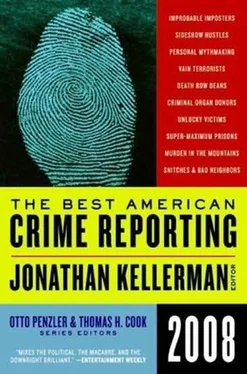Guys like that make it much, much harder for the guys who are legit.”
A STORY ABOUT A LIAR always turns out to be about one thing: He lied. Zeke says he doesn’t talk to his brothers anymore? He lied. Zeke says that he threatened a UPI photographer who took his picture in El Salvador? UPI says it never had a photographer in El Salvador at the time in question.
And yet what haunts me are not Zeke’s lies but the truths he told, or tried to tell, from the moment I met him. He was confessing, after all, and though his confession was a failed one, the impulse behind it brought a psychological truth-the momentum of a man unraveling-to his most outrageous falsehoods. He said that he was a nobody. He said he lacked a moral firewall. He said he lied to his mother like he lied to everyone else. He said that his life was a fake. He said that he’d been a lot of people, and that he’d hurt a lot of people. He even said, at length, in a phone message, that he’d never been to Afghanistan or Iraq. I listened, but I didn’t believe him, because as invested as I was in telling his story, I was even more heavily invested in proving him a killer and not just a liar. I was aware, all along, that he was one or the other, but somehow I could not bear to think that he was just a liar, and neither could he. It was too shameful. So he said he was a killer instead, because he knew that somehow human sympathy extends to killing even as it ends at lying.
He said that he was talking to me because he needed to burn his bridges; because he needed to be stopped; because he didn’t want to hurt any more people. I believed him then. I believe him now.
TOM JUNOD lives in Marietta, Georgia, with his wife, his daughter, and his pit bull, a rescued fighting dog named Carson. Though Junod’s been writing for Esquire for ten years, he was shocked by the extent of “Zeke’s” lies, and to a certain degree still is.
Coda
Bill “Zeke” Clark resigned from Palisades Nuclear in early May 2007, the day “Mercenary” was posted on Esquire ’s website. The story itself prompted several investigations into the question of how someone like Clark was hired in the first place, and one of his former colleagues at Palisades said, “I suspect it’s going to change the way the entire industry works, when it comes to hiring people.” Then he added, “If you ever talk to Zeke, tell him he didn’t have to lie. We’d have liked him anyway.”
I have not spoken to Clark since the story’s publication, so I have no way of knowing if he’s still lying. I have, however, remained in contact with his ex-wife and his son, who told me that after he resigned from Palisades, he left Michigan and moved to the state where his parents are living. There, he “hit bottom,” sustaining himself as a laborer and a construction worker, until November 2007, when he was contacted by a British security company. Then, as Rick Clark says, “he finally got to Iraq. He was doing security for vehicle convoys. But he got over it pretty quick. He didn’t want to be a trigger puller. He said it was a young man’s game. He even got wounded. He took a piece of shrapnel in his back. All he got was a bad bruise. But if he didn’t have body armor, he’s toast. He’s in Nigeria now. He’s training troops. There are troops all over the world, and they need trainers. It’s what he wants to do; it’s what he’s best at.”
This all sounded uncannily familiar, and I asked Rick Clark if he believed his father. “I decided to believe it,” Rick Clark said. “I have no logical reason. But we’ve pretty much reconciled, and if after everything we’ve gone through he’s still spinning…Well, I want what he’s saying to be true.”
At this writing, Bill Clark is still married to Baby Doll.
Jonathan Green: MURDER AT 19,000 FEET
FROM Men’s Journal
THE FIRST GUNSHOT went largely unnoticed by the climbers. Most were still in their tents-the sun had risen, but it hadn’t been up long enough to blunt the knifing cold-and no one expected to hear small-arms fire on a mountaineering expedition, much less at 19,000 feet in the Himalayas. Later, though, a few climbers would recall that the ravens that hung around camp had suddenly lifted from the snow in a small, black, squawking cloud, a missed omen.
Earlier on September 30, 2006, the first clear day in a week, the Sherpas in camp had conducted a ritual for the safety of the climbers. There were at least 100 at Cho Oyu advanced base c & most had not yet made their attempts on the summit because of the poor weather. The world’s sixth-tallest mountain, Cho Oyu is the second most popular Himalayan peak, and it’s often used as a test run for those who aspire to climb the most popular one, Mount Everest, 19 miles to the east. As part of their ritual the Sherpas had uttered incantations beneath fluttering Tibetan Buddhist prayer flags and burned juniper, which left a resinous aroma around the 70 or so brightly colored tents.
Among those the Sherpas blessed was Luis Benitez, a 34-year-old commercial guide from Colorado who was getting his three clients ready for the four-day summit push. When the first rifle shot was fired, his crew were in their tents packing, sorting, and repacking, and could have mistaken the gun’s report for a snapping tent flap.
A few minutes later, near 8 AM, Benitez’s team had gathered at their dining tent for breakfast. Moments later two of Benitez’s Sherpas burst in: “Chinese soldiers are coming, very bad!” This time they all heard the distinctive, percussive cracks from Type 81 assault rifles, the Chinese answer to AK-47s.
Benitez and the others dropped their mugs and ran outside. They were shocked to find a handful of Chinese soldiers belonging to the People’s Armed Police, or PAP, a mountain paramilitary unit, lined up on a shelf of ice over the moraine about 500 yards away. They were doing most of the firing. Others, hefting matte black rifles, marched toward the camp. Still other soldiers, in small clusters, perhaps three or four in each, were farther down along the icy, hummocky terrain, about 200 yards. As they popped off rounds, the smell of cordite had replaced juniper in the air.
At first some of the climbers thought the gunmen might be shooting at animals. Then, to their horror, they realized that the soldiers were actually taking aim at two snaking lines of 20 to 30 people moving up a glaciated slope at least 100 yards away. Against the aching white expanse of snow the figures were tiny black silhouettes, but even at a distance of several hundred yards, the climbers could make out that many of the figures were smaller still-children-and stumbling as the bullets thudded around them. At that range, the Type 81s-street-fighting weapons, not sniper rifles-are woefully inaccurate, so the gunmen were essentially taking potshots.
Benitez heard cries of anguish drifting across the glaciated pass, punctuated by the crack-popping of the Chinese Kalashnikovs, which made his ears ring. Taking a grave risk, Romanian climber Sergiu Matei, 29, took out his Sony DCR170 video camera. “They are shooting them like dogs,” he uttered. Then what looked to be three figures dropped to the snow. Two struggled up and staggered on. One figure tried to crawl, but then collapsed in an immobile heap.
CHO OYU, ELEVATION 26,906 FEET, lies just north of Nepal in Tibet. Sherpas know it as the Turquoise Goddess, while some Tibetan Buddhists believe that Padmasambhara, who brought Buddhism to Tibet, buried instructions on how to save the earth from chaos somewhere on the mountain. At the height of the main climbing season, in autumn, the slopes of Cho Oyu are as cosmopolitan as an olympiad, as climbers from around the world make for the top of the sacred massif, the easiest of the earth’s 14 peaks that rise above 8,000 meters (or 26,247 feet). In September 2006, advanced base camp had alpine athletes from the U.K., France, Australia, New Zealand, Romania, Slovenia, Russia, and the U.S., among others.
Читать дальше












